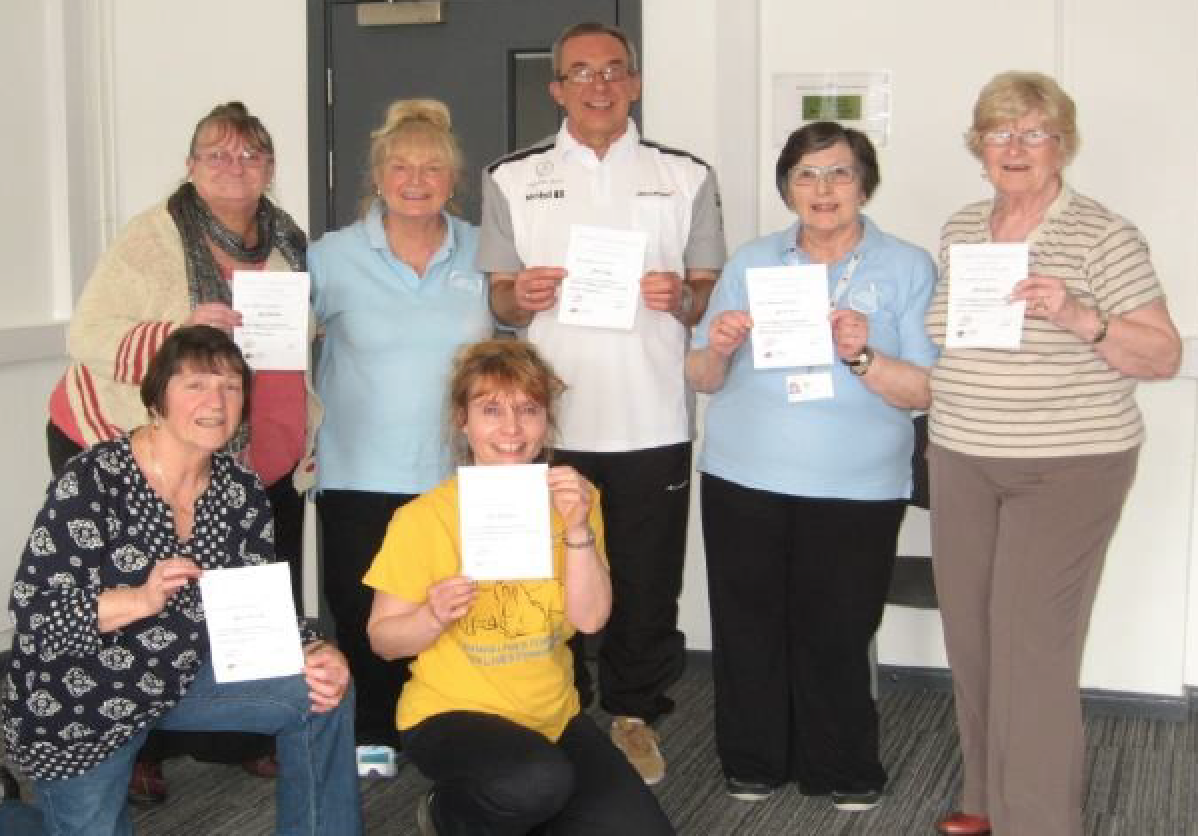RCC1. Making Shibashi Style Tai Chi Sustainable in the community
Proposer: Bill Gwyther – Volunteer in the Wellbeing Collaborative – Cohort One Change Champions course
Funding allocated: £2,350
The proposal:
One of the activities that over 50s are very keen to do is the practice of shibashi style tai chi This is very beneficial for older people in reducing anxiety, hypertension, increasing their balance, their confidence and their sense of wellbeing.
In the Wellbeing Collaboratives, community volunteers, many of whom are retired, are trained to deliver this exercise. This gives them the chance to study again and gain a qualification. This in turn provides them with a great sense of achievement in the autumn of their life and they remain active. Working on the ethos that prevention is better than cure. Tai chi is one intervention that produces important benefits for the activities of daily living. Such as standing, walking descending stairs, and reaching to pick up objects from the floor. The benefits from practising tai chi include greater flexibility, improved muscle strength, and coordination. There is significant clinical research evidence to prove the benefits of tai chi to older people.
Once we have our volunteers trained to deliver this form of exercise they will then go on to open and set up new over 50s clubs in our area. We have many personal testaments from members that are amazed with the difference they have found within themselves both mentally and physically. Our clubs see an average of 25-30 members practising every week and we have 21 clubs at the moment. We are reaching over 200 older people every week and making a difference to their health & wellbeing.
We would like to double the availability of tai chi using extra trained volunteers. This could have significant advantages to our local economy. By implementing prevention programs we could potentially save the NHS considerable amounts of revenue. Interventions are needed that will reduce the significant incidence of falls in the older age group. Predictable consequences of falls include fractures, hospitalizations and inevitably death from complications brought about by inactivity, immobility and infection. For these reasons our prevention strategy of socialising, exercising and joining in are important considerations to focus on for these support funds to be of benefit to the older people of North East Lincolnshire.
The New Volunteer tai chi trainers with their certificates
What the money was spent on!
Item Cost Total
Training First Aid Singletons
£96.00
Cert training PTTLS
£270.00
OCN Active in age training
£400.00
Room Hire @ £15.00 per hour
£1,680.00
Room Hire
£276.00
Stationery
£20.00
Catering
£94.50
First Aid Training
£240.00
Insurance PLI
£358.50
Electrical Equipment
£275.94
Music CD’s
£159.02
Category sub-total
£3,869.96
We were awarded £2350 and to develop the service we spent £3,869.96. The difference of £1519.96 was contributed by the Wellbeing Collaboratives team to enhance the original plans for the service.
What was achieved!
We now have 6 more fully trained volunteer tai chi instructors working in North East Lincolnshire. This enables us to cover for sickness and holidays and to maintain the provision. The volunteer tai chi instructors all have classes at varying venues including the 21 Wellbeing collaborative over 50s social clubs. They also work in partnership with other organisations to provide tai chi.
Part of the training was to achieve the Preparing to Teach in the Lifelong Learning Sector (PTTLS) course which enables the person with the PTTLS qualification to train others. The team is currently preparing a Train the Trainer Programme so that they can train others in the Shibashi style tai chi approach.
From their records we have another 89 (average) over 50’s now practising tai chi on a weekly basis who didn’t practice it before. There are detailed figures available on attendances at the 21 social clubs for tai chi. This results in a unit cost of the investment of £26 per new attendee at the time of writing this case study. This figure will continue to reduce over time and the service is now sustainable without any additional benefit or investment from elsewhere.
The volunteers are giving an average of 7 hours per week @ £11.00 per hour, 40 weeks a year, therefore giving £18,480 into the project in kind.
Publicity for this project includes Posters created to advertise new sessions and distributed in the local communities. Website and twitter media used to advertise clubs.
Update 2016
Marie & Josie took the time to tell us about the progress in the new clubs which now have 20 new members. One of the members’ granddaughters designed flyers and the club members leafletted local homes.
Making sessions fun, having a laugh and keeping it interesting is what makes the clubs successful. However, there have been a few challenges along the way such as getting the numbers up to start with, expensive venues and getting someone to fill in for you can be an issue. However this latter issue is now resolved with the addition of new trainers. Another issue is maintaining the consistency of approach as the number of trainers increase. Shoreline used to provide a tai chi course but this has now stopped.
One of the members reports an increase in confidence resulting from the training to be a Tai Chi trainer. She also explained how she had used this confidence to join weight watchers and has now lost 4 stones in 11 months.
The members report that one of the problems for older people accessing social events and exercise is the distance to travel from home and the lack of safe public transport. Having Tai Chi classes in the communities helps older people to engage. Other local clubs have recently closed – such as LincsInspire Tai Chi and this has resulted in an influx of new members. The final comment from the group was to say how awful it would be if the club closed – it would be a loss of a community and some people are so committed to attending that they take three buses to get there.
Sustainability
The trainers would like the opportunity to have a twice yearly update so they can get together and learn and share.


